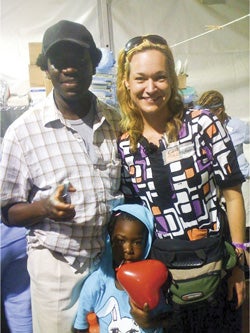Mission to Haiti

After the devastating earthquake in Haiti, Ewa M. Dzwierzynski, Pharm D. ’96, answered the urgent call for volunteer pharmacists through the American College of Clinical Pharmacists. Here’s her account:
Shortly after the plane touched down in Port-au-Prince, two volunteer pharmacists and I were taken to a makeshift 300-bed field hospital located adjacent to the airport that included a supply tent and a general medical ward tent that housed the X-ray and wound care area. An adjacent tent included the pediatric ward and a newly opened neonatal and pediatric intensive care unit.
Before we arrived, there wasn’t a narcotic inventory and supplies were extremely limited. All medical supplies were mixed with an assortment of donated medications. Crates of donated boxes sat unopened in the supply yard. No one knew what medications were in stock or the quantities available, which turned out to be one of the most challenging obstacles.
I work as a clinical pharmacy specialist on the Trauma Intensive Care Unit at Rhode Island Hospital, so I assumed I would help care for the adult critical care population at the field hospital. But since I was one of a few pharmacists with pediatric experience—I worked overseas at the Landstuhl Regional Medical Center in Germany—I volunteered to staff the neonatal unit.
Three of us staffed the unit 24 hours a day, seven days a week. Resources were limited, which made everyone become resourceful. I recall fashioning a mortar and pestle out of a glass vial and Dixie cup to crush tablets so that I could make an oral suspension for the babies in our care.
I also covered the medical intensive care unit. When we ran out of fentanyl and midazolam for sedation, we had to devise therapeutic alternatives with the resources available. This turned out to be one of the most important roles we played. Many of the doctors, nurses, ancillary staff, and commanders recognized our importance and developed a plan to hire a full-time pharmacist for the facility.
My most memorable patient was an 8-year old girl named Paulna who was brought in with acute respiratory distress syndrome by Brazilian missionaries. She was so ill many thought she would not survive. Within a couple of days of receiving exceptional care in the pediatric intensive care unit and broad-spectrum antibiotics, she recovered. It truly was a miracle. Seeing Paulna’s beautiful smiling face made the long hours and primitive conditions worth the effort.
The time I spent in Haiti was definitely the most challenging and rewarding professional experience in my career. It changed my outlook on life both professionally and personally.
By Ewa M. Dzwierzynski, Pharm D. ‘96
 Home
Home Browse
Browse Close
Close Events
Events Maps
Maps Email
Email Brightspace
Brightspace eCampus
eCampus


